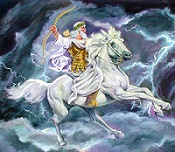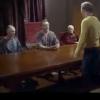Hello, anyone still checking this thread Itala Bible Waldensian?
Please keep us posted if there are any new & "safe" links to read old Itala Bible.
A late deacon Richard Close who often jumped to conclusions, assumed that a study of Matthew 11:30 done by Frank Nelte is factual enough to re-post to his church despite how Frank Nelte claims the Matt 11:30 phrase "my yoke is easy & my burden is light" was corrupted by Vulgate and "should have" been translated as : my yoke is (chrestos)"good/kind/better" and my burden is (elauno)"driven with effort as rowing a boat".
Mr. Nelte & then Mr. Close claim(ed) that Strong's G1645 elaphron/"light, easy" is SO MUCH AKIN to Strong's G1643 elauno/"driven with effort", that G1643 elauno is "actually" what Jesus MEANT instead of Strong's G1645 elaphron, in Matt 11:30.
Those 2 men avoid how Strong's says elauno is ONLY "akin" to elaphron, & not freely interchangeable.
I can see that chrestos/Strong's G5543 makes sense to be put onto "my yoke is good/kind" instead of "my yoke is easy", but Nelte in 2021 & then later Close in 2022 seem off base to switch "my burden is light (G1645 elephron)" into (their opinion of meaning) rather : "my burden is driven (G1643 elauno).
I would like to keep seeking the Itala Bible from Waldensians or Papyrus 62 or any early truths of actual Matt 11:30, to see if Mr. Nelte & Mr. Close were jumping to conclusions unwisely (or not) when they claim Jesus's burden & lifestyle for us is NOT light but a "driven struggle" (elauno vs. elaphron)!
The Waldensian Bible may show pre-Vulgate in order to settle whether Nelte & Close have permission they "think" they had, on maybe changing Jesus' own words around! Mr. Close passed away soon after pressing onto us, of this possibly rude study he copied from Mr. Nelte.
I also hope to compare Papyrus 62 Matt 11:30 early Greek with this dilemma brought to us by Nelte & Close. I have already been trying that, by using cut/paste of current Greek Matt 11:30 into screenshots superimposed next to the fragments Wikipedia shows of Oslo Library collections of Papyrus 62/Matt 11:30. Fragments are hard so far to see any hint of either "elaphron", or "elauno".
An Overseer Pastor of a church has visited Vatican City & I almost wonder if he tried to study the locked away collections of Itala (Waldensian pre-Vulgate) Bible, but must have not been able to see it.
Can anyone post here soon if they know how to see or study or download the Itala Bible of Waldensians? Or also of tips how to study Papyrus 62 or anything even earlier than that...the earliest possible pen marks from Apostle Matthew himself?
I want to see if Jesus meant "my yoke is easy/good and my burden is light" or if He meant "my burden is driven effort".
But to Mr. Nelte & (would have been to) Mr. Close, Strong's says G1645 elaphron IS ONLY AKIN, to, G1643 elauno...they are likely NOT WILLY-NILLY interchangeble!
Answer may be in Waldensian Itala Bible? thanks.
Hi Ukelele, I don't usually log on and check this thread, but my email notified me that someone commented, so I checked it.
No, I have not found the Waldensian Itala yet - powers-that-be have seemed to make sure it is not available for the common man to find. Though I have found other Waldensian Bibles, so I think I can at least partially answer your question.
My advice as far as the two individuals that you mentioned is that they sound rather "higher critical" to me, and I would recommend steering clear of their materials. Any time someone starts "redefining" what the plain and simple Word of God says, I see red flags. God's Word is simple enough for the common man to understand! God (and Jesus) says exactly what He means in the KJV English. It is the "higher critics" that start undermining God's Word and saying things like, "This or that is not translated right..." or "What it really meant to say..."
They also like to refer back to the LXX - but there were 3 different Septuagints - 2 that were corrupted and only 1 that was correct - and the LXX that is used today was one of the corrupted ones. You can read about some of this history as well as the various Bible translations in this PDF book https://archive.org/...word-unsheathed
As for Matthew 11:30, Yes, the original KJV translators translated that verse accurately - just as they did all the others. Every single KJV translator was fluent in 4 languages (Hebrew, Greek, Latin, English) and many of them knew and were fluent in others as well. They were more knowledgeable and proficient than any scholar alive today. And on top of that, they had access to many manuscripts and reference materials that we either don't have or have forgotten about today.
With Matthew 11:30 it reads, "For my yoke is easy, and my burden is light." (or it's equivalent) in every single pure-line Bible from every language I've checked - including the Bohemian Tepl Bible (which is a Waldensian Bible) and the Olivetan Bible (which was an old French Bible translation that was made by the Waldensians as a gift for the Protestant Reformation.) You can find these Bibles, as well as other pure-line Bibles, posted on this site. Hope that helps. God Bless.






 Find content
Find content Not Telling
Not Telling





